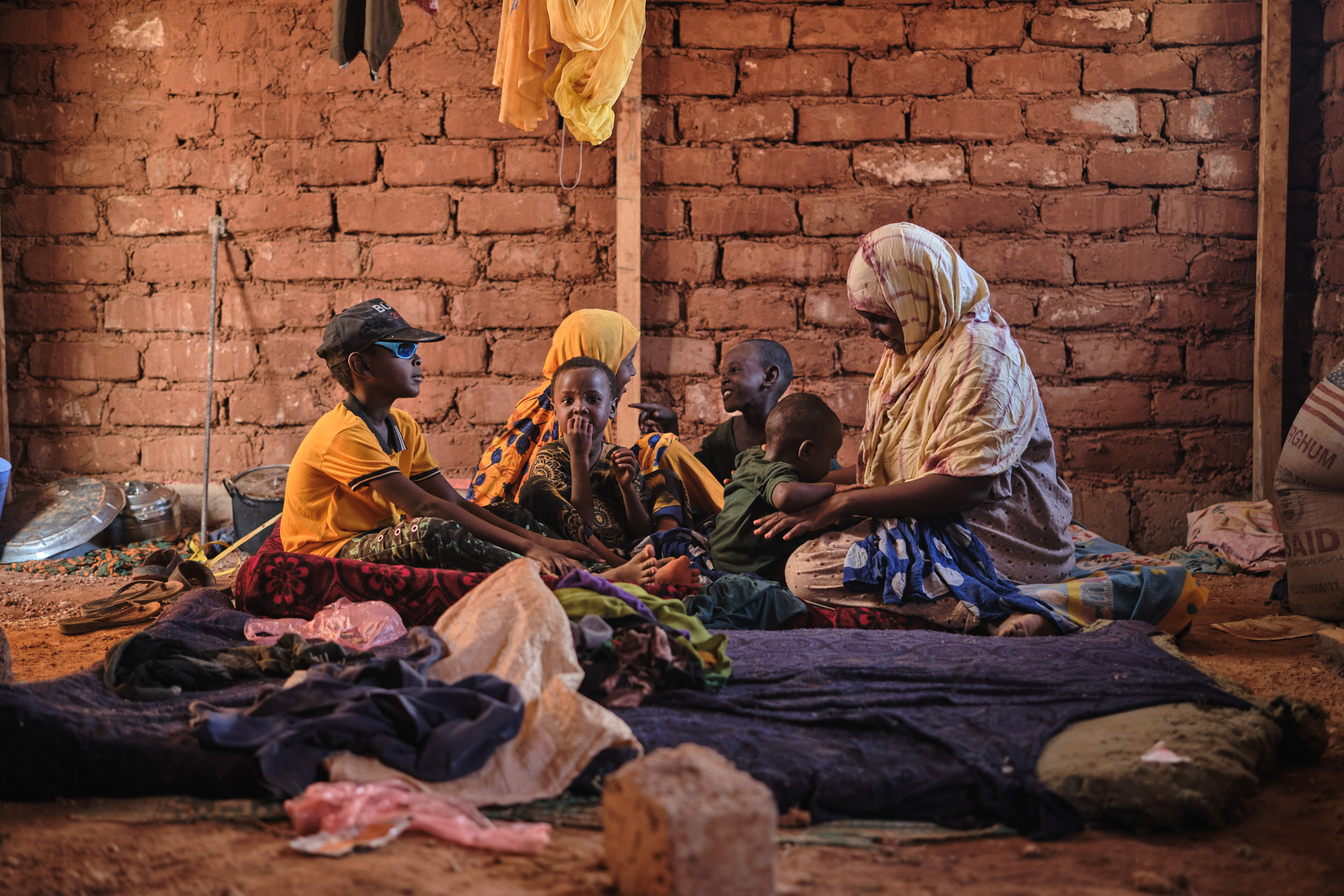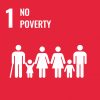Doolow, 17 July 2023 – Every morning for the past two months, Mohamed Ali begins his day by lighting a small fire in front of his modest shelter, preparing for a daily routine that brings a comforting sense of normalcy to the residents of Ladan, a large informal settlement in Somalia's border town of Doolow.
With a gentle gesture, Mohamed pours water and sugar into a pot, then adds freshly peeled ginger and blends it with black tea. This simple yet straightforward business idea has transformed into more than a mere morning ritual – it has become a lifeline for Mohamed's family, who have relied on humanitarian aid for over a year.
“Our tea shop attracts many visitors, particularly those involved in constructing the shelters who frequent the shop for tea and breakfast,” he says while serving cups of tea and ambasha bread to customers.
Originally from the Oromo region of Ethiopia, Mohamed's life was upended by conflict in his homeland. In search of a safer environment to raise his children, he found himself in Ladan, disconnected from his roots and livelihood.



Mohamed and his wife have established a tea shop in their new shelter, generating an income by serving tea and breakfast to the residents of Ladan each morning. Photo: IOM/Claudia Rosel
Similar to many of Somalia's informal settlements, Ladan has become a refuge for hundreds of thousands of families who have lost everything amidst ongoing humanitarian crises.
Initially formed in November 2021 due to a severe drought, the site rapidly became home to individuals displaced from various parts of the country and neighbouring Ethiopia. As months passed, a continuous flow of arrivals, including those fleeing conflict, led to overcrowding, inadequate infrastructure, and safety concerns within the settlement. By March 2023, the population exceeded 15,000, with residents living in precarious and unsafe conditions.
“We arrived here a year ago. At first, we lived in makeshift structures, unable to improve our situation. However, when we acquired this new space, we saw an opportunity to open this tea shop,” says Mohamed.
The space Mohamed refers to is his new shelter, which is part of an ongoing housing reconfiguration and decongestion plan led by the International Organization for Migration (IOM). This plan aims to enhance living conditions in displacement sites while offering residents a chance to rebuild their lives with dignity.


Makeshift and improvised shelters at the Ladan displacement site pictured in May 2023 (left). Newly constructed shelters as part of IOM’s reconfiguration initiative in May 2023 (right). Photos: IOM/Ismail Salad Osman
“While places like Ladan provide temporary respite for displaced individuals, they fail to address the underlying causes of displacement. Residents struggle to fully integrate and can become trapped in a cycle of aid dependency,” explains Frantz Celestin, IOM Somalia Chief of Mission. “We strive to find sustainable solutions, particularly as many of those displaced will not be able to return to their places of origin.”
Developed in consultation with the community and other humanitarian partners in Doolow, the plan encompassed clearing 22 hectares of land, excavating 18 kilometers of drainage systems, installing 570 meters of reinforced culverts, constructing 460 new latrines, and demarcating 1,500 plots to facilitate family relocations.
“These improvements attracted partners and services to build a new school, set up a nutrition centre, medical clinic, and create a dedicated safe space for women,” says Celestin.
Learning from past experiences, IOM also started the construction of enhanced shelters for 1,500 families who were previously residing in makeshift structures.
“IOM's technical teams designed a new model that includes basic enhancements such as a stronger foundation, raised plinth row, increased height, and improved roofing,” explains Boshra Khoshnevis, the IOM architect who oversaw the project.

Aerial view of newly constructed shelters using the mudbrick technique. Photo: IOM/Ismail Salad Osman
These features prolong the lifespan of the shelter while enabling families to easily upgrade them as they acquire more resources. They not only shield against the elements but also provide privacy, security, dignity, and improved health for their occupants.
Furthermore, the design allows for gradual upgrading into more durable homes with mudbrick walls – a cost-effective, sustainable, and environmentally friendly technique. The process of creating mud bricks requires no advanced skills or machinery, empowering the community to participate and learn how to enhance their own homes.
To carry out the construction works, IOM engaged 200 residents from Ladan, including 120 unskilled labourers, who received training under IOM's supervision. Additionally, 300 residents were involved in excavation for drainage systems, and 15 individuals coordinated plot demarcation and bush clearance.




IOM teams actively engaged and consulted with community members and local representatives throughout the reconfiguration planning process. Many of those individuals actively participated in the construction works as pictured above. Photo: IOM/Claudia Rosel
Among the engaged residents was Simaneh, a former pastoralist who received a new shelter and participated in its construction, earning a small salary to support his family.
“This is a much better place to live compared to how we were before. I own a donkey cart and contribute by transporting bricks for the construction,” he said.

Simaneh had to leave his life in Ethiopia behind due to conflict and drought. He lived in precarious conditions in Ladan for seven months before being relocated. Photo: IOM/Claudia Rosel

Asha, who is nine months pregnant, was among those who benefited from the relocation, along with her father and brother. Photo: IOM/Claudia Rosel

Hawa and her family are among those who have enhanced their shelter by utilizing mudbricks. “We can put our bed inside and fit all of us here. The shelter is cool, and we have a lot of privacy. We are grateful, and we hope our neighbours get the same type of shelter.” Photo: IOM/Claudia Rosel
By offering temporary job opportunities, the community not only played an active role in constructing their new homes but also earned income to meet their basic needs.
For Muslimo, the intervention has been life changing. When IOM first encountered her in Ladan in October 2022, she was living in a makeshift shelter and expressed how her pot “had been empty for days.” The 70-year-old had fled her village after one of her sons succumbed to hunger.
“Ever since we met last year, my entire life has turned around. I was squeezed into a tiny, cramped place where privacy was non-existent, and I never felt at ease. All I desired was to create something that would alleviate my livelihood concerns,” she reflects.
Those hopes became a reality when she was relocated to one of the improved shelters.
“We still face challenges in accessing food, but thanks to the space and privacy, I managed to start a small business,” she proudly shares, showing the charging station she has set up inside her shelter.


IOM photographed Muslimo in October 2022 while she was living in a makeshift shelter in Ladan (left). IOM revisited Muslimo in her newly assigned shelter in May 2023 (right). Photos: IOM/Claudia Rosel
Like Muslimo, several families who were relocated have leveraged the spacious and secure environment to establish small businesses, generating modest incomes. Some have invested in solar panels to provide phone charging services, while others have opened grocery shops, tea stalls, and even small tailor workshops.
“We charge 0.10 cents of a dollar to charge the phone, and we usually earn USD 1.5 a day. It is sometimes not enough to meet the needs of our eight chilldren, but it is what we have,” says Hawa Hassan, whose family was among those supported in building a mudbrick shelter.
These initiatives not only help residents of Ladan to meet their essential needs but also gradually reduce their reliance on humanitarian aid, fostering a sense of empowerment and self-sufficiency within the community.
As the day ends, Mohamed bids farewell to some clients with a smile on his face. “It is not just about making ends meet, but also to feel you are doing something for your community,” he says as he closes the doors of his tea shop.


Abdi was displaced from the Sool region in 2019 and has since then lived in precarious conditions at various displacement sites, mostly relying on humanitarian assistance. The former pastoralist has now started a small grocery shop in his new shelter, which allows him to earn an income and support his family, reducing their dependency on aid. Photos: IOM/Claudia Rosel
These collaborative efforts between IOM, the community, and various stakeholders to reconfigure and improve the living conditions in Ladan have paved the way for a more inclusive and integrated environment, promoting the well-being and self-sufficiency of both displaced individuals and the host community in Doolow. IOM currently seeks additional funding to continue supporting these activities and reach more vulnerable families.
The project was possible thanks to generous funding from the Government of Japan, the United States Government and the European Union.
Story and photographs by Claudia Rosel, IOM Somalia Media and Communications Officer, cbarrios@iom.int / smsom-media@iom.int



